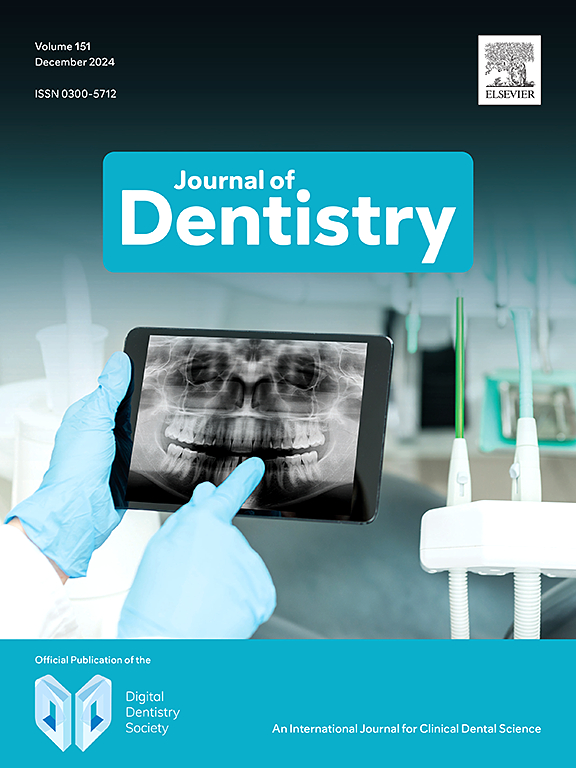General health-related quality of life and oral health in older adults: A systematic review
IF 4.8
2区 医学
Q1 DENTISTRY, ORAL SURGERY & MEDICINE
引用次数: 0
Abstract
Objectives
To systematically review the association between oral health conditions and older adults' general health-related quality-of-life (HRQoL).
Data
Population-based observational studies and randomised clinical trials addressing associations between oral health conditions and HRQoL in adults aged 60 or older were considered for inclusion following the Preferred Reporting Items for Systematic Reviews and Meta-Analyses (PRISMA) guidelines. The Newcastle-Ottawa scale was used to assess the quality of the selected studies.
Sources
The PubMed/Medline, EMBASE, Web of Science, and SciELO databases were systematically searched using the validated strategy, following the guidelines of the Peer Review of Electronic Search Strategies (PRESS) guidelines, up to February 7, 2025.
Study selection
This review included 35 cross-sectional and 3 cohort studies from 36 articles, encompassing 111,592 participants from 18 countries, with sample sizes ranging from 103 to 27,629. Twelve HRQoL instruments were identified, with the most commonly used being EuroQoL (n = 12), SF-36 and its short versions (n = 9), and WHOQOL (n = 6). The number of teeth was the most studied oral health exposure (n = 27), followed by chewing difficulty (n = 12). Thirteen articles reported adjusted analyses. Overall, having fewer teeth (n = 21) and experiencing chewing difficulty (n = 11) were associated with worse HRQoL.
Conclusions
Fewer teeth and chewing difficulty negatively impacted HRQoL, with chewing difficulty emerging as a novel finding in systematic reviews.
Clinical significance
Healthcare providers should implement targeted interventions to maintain functional teeth and improve chewing ability in older adults. This approach will enhance their overall physical, mental, and social well-being, ultimately improving their quality of life and longevity.
老年人总体健康相关生活质量和口腔健康:系统综述。
目的:系统回顾口腔健康状况与老年人总体健康相关生活质量(HRQoL)之间的关系。数据:根据系统评价和荟萃分析(PRISMA)指南的首选报告项目,考虑纳入基于人群的观察性研究和随机临床试验,研究60岁或以上成年人口腔健康状况和HRQoL之间的关联。纽卡斯尔-渥太华量表用于评估所选研究的质量。来源:PubMed/Medline、EMBASE、Web of Science和SciELO数据库使用经过验证的策略进行系统搜索,遵循同行评审电子搜索策略(PRESS)指南的指导方针,截止到2025年2月7日。研究选择:本综述包括来自36篇文章的35项横断面研究和3项队列研究,包括来自18个国家的111,592名参与者,样本量从103到27,629不等。确定了12种HRQoL工具,其中最常用的是EuroQoL (n=12), SF-36及其简短版本(n=9)和WHOQOL (n=6)。牙齿数量是研究最多的口腔健康暴露(n=27),其次是咀嚼困难(n=12)。13篇文章报告了调整后的分析。总体而言,牙齿较少(n=21)和咀嚼困难(n=11)与HRQoL较差相关。结论:较少的牙齿和咀嚼困难对HRQoL有负面影响,咀嚼困难是系统综述中的一个新发现。临床意义:医疗保健提供者应实施有针对性的干预措施,以维持老年人的牙齿功能和改善咀嚼能力。这种方法将提高他们的整体身体,心理和社会福祉,最终提高他们的生活质量和寿命。
本文章由计算机程序翻译,如有差异,请以英文原文为准。
求助全文
约1分钟内获得全文
求助全文
来源期刊

Journal of dentistry
医学-牙科与口腔外科
CiteScore
7.30
自引率
11.40%
发文量
349
审稿时长
35 days
期刊介绍:
The Journal of Dentistry has an open access mirror journal The Journal of Dentistry: X, sharing the same aims and scope, editorial team, submission system and rigorous peer review.
The Journal of Dentistry is the leading international dental journal within the field of Restorative Dentistry. Placing an emphasis on publishing novel and high-quality research papers, the Journal aims to influence the practice of dentistry at clinician, research, industry and policy-maker level on an international basis.
Topics covered include the management of dental disease, periodontology, endodontology, operative dentistry, fixed and removable prosthodontics, dental biomaterials science, long-term clinical trials including epidemiology and oral health, technology transfer of new scientific instrumentation or procedures, as well as clinically relevant oral biology and translational research.
The Journal of Dentistry will publish original scientific research papers including short communications. It is also interested in publishing review articles and leaders in themed areas which will be linked to new scientific research. Conference proceedings are also welcome and expressions of interest should be communicated to the Editor.
 求助内容:
求助内容: 应助结果提醒方式:
应助结果提醒方式:


